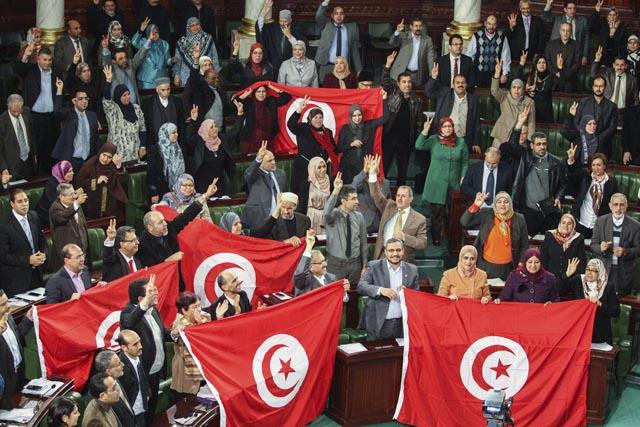TUNIS — US Secretary of State John Kerry arrived in Tunisia Tuesday on an unannounced trip to lend support to the North African country that ignited the Arab Spring three years ago.
Kerry met President Moncef Marzouki and was later to hold talks with newly appointed Prime Minister Mehdi Jomaa, who formed a Cabinet of independents in January after a months-long political crisis ignited by the killing of two secular politicians.
“We are very impressed by the steps that you have been taking, by the rational, thoughtful approach to the transition,” Kerry told Marzouki.
He went on to congratulate Tunisia on its adoption of a new constitution last month that has been widely hailed as the most progressive in the region, calling it a “big step”, and said he looked forward to elections planned for later this year.
Kerry’s discussions with Tunisian leaders were to focus on “the progress made in Tunisia’s democratic transition”, and to show the “continued US support for the Tunisian people and government”, State Department spokeswoman Jen Psaki said earlier.
The top US diplomat often refers in his speeches to the Tunisian fruit vendor who set himself alight in protest at his country’s lack of democracy.
The shocking self-immolation sparked the January 2011 revolution that toppled the autocratic regime of veteran strongman Zine Al Abidine Ben Ali and ignited the Arab Spring uprisings that spread across North Africa and parts of the Middle East.
“What is unique, or at least striking in particular about Tunisia, is the willingness of opposing sides to reach out and show some inclusiveness and cooperation,” a senior US administration official said, asking not to be named.
“What’s positive and even inspiring in Tunisia is the demonstrated willingness not to take power and hold on to it,” he added, pointing to the new constitution adopted last month and the swearing in of a new technocratic interim government.
Progress despite violence
Tunisia’s new leaders have grappled with violence amid a surge in Islamist unrest, which also led to the assassination last year of two opposition politicians, Chokri Belaid and leftist MP Mohamed Brahmi.
The killings sparked a political crisis between the governing Ennahda party, a moderate Islamist movement, and its secular opponents, from which the country is only now emerging with the adoption in January of the new constitution.
Ennahda, which won Tunisia’s first free elections in October 2011, stepped down in January under a hard-fought agreement to end the crisis, allowing Jomaa to form a caretaker Cabinet tasked with leading the country to fresh elections.
But despite the dramatic political progress achieved in recent weeks, Islamist violence continues to pose a threat.












